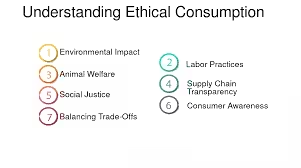In today’s world, consumers are increasingly aware of the impact their choices have on the environment, society, and animal welfare. Ethical consumption, or conscious consumerism, is a movement that encourages individuals to make informed choices about the products they purchase and the companies they support. By understanding the ethical implications of our consumption habits, we can collectively drive positive change.
Why Ethical Consumption Matters
Ethical consumption is not just a trend; it’s a necessity. Our purchasing power can influence businesses to adopt more sustainable and ethical practices. When we choose products that are ethically sourced, produced, and distributed, we contribute to a fairer and more just world.
Key Ethical Considerations
- Environmental Impact:
- Climate Change: Opt for products with minimal carbon footprints, such as those made from sustainable materials or produced locally.
- Resource Depletion: Choose products that conserve resources like water and energy.
- Pollution: Avoid products that contribute to pollution, such as those with excessive packaging or harmful chemicals.
- Labor Practices:
- Fair Wages: Support brands that pay fair wages to their workers.
- Safe Working Conditions: Ensure products are made in safe and ethical working environments.
- Child Labor: Avoid products that involve child labor.
- Animal Welfare:
- Cruelty-Free: Choose products that are not tested on animals.
- Sustainable Sourcing: Opt for products that use sustainably sourced animal products.
- Ethical Treatment: Support brands that prioritize animal welfare.

How to Practice Ethical Consumption
- Research and Awareness:
- Educate yourself about ethical issues in various industries.
- Stay informed about current trends and certifications.
- Follow ethical consumerism blogs and social media accounts.
- Choose Mindfully:
- Prioritize quality over quantity.
- Buy only what you need to reduce waste.
- Opt for reusable and sustainable products.
- Support Ethical Brands:
- Research brands’ ethical policies and certifications.
- Support local businesses and fair trade initiatives.
- Consider buying secondhand or refurbished products.
- Reduce, Reuse, Recycle:
- Minimize waste by reducing consumption and choosing reusable items.
- Recycle properly to conserve resources.
- Donate unwanted items to charity.
- Engage with Businesses:
- Contact companies to express your concerns or support for ethical practices.
- Share your experiences on social media to influence others.
- Participate in boycotts or campaigns to raise awareness.

The Power of Collective Action
By making conscious choices and advocating for ethical practices, we can collectively create a more sustainable and equitable future. Remember, every small step counts. Join the movement of ethical consumers and let your choices speak louder than words.



